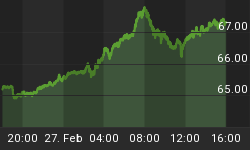BIG PICTURE - Global stock markets continue to defy the odds by advancing amidst bearish sentiment and apocalyptic forecasts.
Today, most pundits are confused and various academics are stubbornly sticking by their negative predictions about the looming deflationary bust. I suspect many investors are eagerly waiting for the much-anticipated decline which will take the markets to fresh bear-market lows; thereby giving them the chance to enter the market at the 'right' price. Despite the scepticism and horrendous news, (so far) the market hasn't obliged. It is interesting to note that rather than correcting, stocks are working off the overbought conditions by simply consolidating. So what's going on here?
It is my firm belief that the market discounted another 'Great Depression' last autumn when we witnessed forced liquidation of all assets. Since then, the financial markets have been building a base and I suspect the bear-market low is now behind us. Now, I'm aware that my assessment may not go down well with some of my more bearish readers, but in this business you take your directions from the tape; instead of the experts. Whether you like it or not, the fact remains that most emerging markets in Asia and Latin America didn't break down to fresh lows in March and they're now trading well above the previous highs recorded in January. Therefore, a case can be made that they are already in the early stages of a bull-market. Similarly, the majority of cyclical stocks also held up during the March meltdown and this is another bullish omen.
As you may remember, a few months ago, I made the case that we were in the early stages of a cyclical bull-market. Well, it looks as though my assessment was correct and we are now likely to see a multi-month rally in global equities. For sure, the US economy is still deteriorating, unemployment is rising, housing is weakening and another global pandemic may be spreading across the world. However, despite all this alarming news, stocks aren't falling apart. If I were to make a guess, I'd say that this is due to the fact that investors had already forecasted a total failure of the banking system last autumn. And when the worst-case scenario didn't materialise, investors' risk appetite returned and they've been snapping up quality stocks at these depressed prices.
Now, I'm painfully aware that America's economic woes are far from over and that it will be several months before the world's strongest nation gets back on its feet. However, unlike some other analysts, I don't foresee a total collapse in the near-future. In my view, what is more likely is that the US economy will muddle through for another year and we'll probably see a short-lived recovery thereafter. Already, certain leading economic indicators are showing signs of bottoming out and it seems that the worst may be over.
Make no mistake, America's establishment has elected to postpone judgement day by using taxpayers' money. Rather than letting the system clear itself out now, Mr. Obama has intervened in the free-market system by nationalising the banks' losses. Furthermore, Mr. Bernanke has used various tools in order to bail-out the banking system. First, he dropped the Fed Funds Rate to almost zero and when that wasn't enough, Mr. Bernanke injected huge amounts of money into America's banking system. It is shocking to note that over the past year, America's monetary base has more than doubled from US$800 billion to roughly US$1.6 trillion (Figure 1)! Finally, Mr. Bernanke recently announced the Federal Reserve's intention of monetising debt by buying US Treasuries from newly created money.
Figure 1: Mr. Bernanke in action!
Source: Federal Reserve Bank of St. Louis
All of these measures may have averted short-term disaster, but all that has happened is that the underlying problems have been postponed into the future. By following the above short-sighted and misguided policies, American leaders have decided to burden their children and grandchildren with even greater quantities of debt.
It is my observation that the American establishment's prime motive is to prop-up asset markets; never mind that such an objective will incur a massive cost to the American society. Let there be no doubt that by printing money, running massive deficits and increasing the national debt, American leaders are debasing their currency and setting the stage whereby foreigners will end up owning a large chunk of corporate America.
There is no doubt in my mind that over the following years, we will witness a massive shift of wealth and power from the West to the East. Over the past few decades, American companies were at the top of their game and they infiltrated the whole world. Now, it is probable that over the coming decade or two, we will see more and more foreign companies and governments increasing their stakes in American corporations.
In summary, the recent policy measures (monetary and fiscal easing accompanied by the nationalisation of private losses) adopted by the US government may have succeeded in stabilising the economy and supporting asset prices in the near-term, but the end result will be a significantly weaker US Dollar and very high inflation.
Courtesy of the global stimulus, the price of precious metals and other tangibles should appreciate over the following years. However, over the short-term, if seasonal trends remain intact, gold is likely to correct over the summer months. Same applies to other precious metals. Therefore, nimble traders may want to sell out of bullion with the intention of buying back in a few weeks time. Long-term investors should ignore the action and simply go for a nice summer holiday. Precious metals mining stocks have a tendency to fall sharply over the summer so wait for a pullback before investing additional funds.















